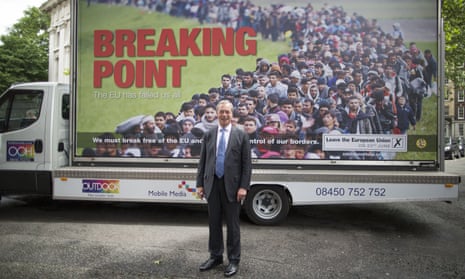British politicians helped fuel a steep rise in racist hate crimes during and after the EU referendum campaign, a UN body has said.
The committee on the elimination of racial discrimination said many prominent politicians should share the blame for the outbreak of xenophobia and intimidation against ethnic minorities.
It said it was deeply concerned that the referendum campaign was marked by divisive, anti-immigrant and xenophobic rhetoric.
“Many politicians and prominent political figures not only failed to condemn it but also created and entrenched prejudices, thereby emboldening individuals to carry out acts of intimidation and hate towards ethnic or ethno-religious minority communities and people who are visibly different.”
More than 3,000 allegations of hate crimes were made to UK police – mainly in the form of harassment and threats – in the week before and the week after the 23 June vote, a year-on-year increase of 42%.
The UN committee said it was concerned that the increase in hate crime notifications did not reflect the true extent of the problem, and that proportionately few reported cases resulted in successful prosecution. “As a result, a large number of racist hate crimes go unpunished.”
The committee did not name any politicians. However, the referendum campaign threw up allegations of racism against the prominent leave campaigner and former Ukip leader Nigel Farage, whose notorious anti-migrant “Breaking Point” poster was reported to the police for inciting racial hatred.
The UK government said in response to the committee that it had a “zero tolerance” approach to hate crime. “We have in place one of the strongest legislative frameworks in the world to protect communities from hostility, violence and bigotry. We keep it under review to ensure it remains effective and appropriate – and recently published a comprehensive new hate crime action plan to drive forward the fight.”
The committee added that the negative portrayal of minorities, immigrants, refugees and asylum seekers by the UK media, particularly in the aftermath of terrorist attacks, was also a concern.
It called on the British government to investigate all reported acts of racist hate crime and ensure that perpetrators received appropriate legal sanctions. Ministers should also adopt comprehensive measures to combat racist hate speech and “xenophobic political discourse” on the internet.
The government’s anti-terrorism Prevent strategy had created “an atmosphere of suspicion towards members of Muslim communities”, the committee said. Ministers should introduce safeguards to ensure the strategy did not discriminate on grounds of race, colour or ethnic origin.
It warned that government proposals to scrap the Human Rights Act and replace it with a new British bill of rights could lead to “decreased levels of human rights protection” in the UK.
The chair of the Equality and Human Rights Commission, David Isaac, said: “There is no place for racism and hatred in a modern Britain and we share the UN’s serious concerns about the recent spike in race-hate incidents.
“In the weeks before and after the Brexit vote we saw reports of race-hate incidents rise significantly. We support the UN’s recommendations for effective investigation and prosecution of all acts of racist hate crime and wide-ranging action better to deter and punish perpetrators.”
Dr Omar Khan, director of the Runnymede Trust, said the committee findings shamed Britain: “This report will embarrass the UK on the world stage and restrict the UK’s ability to criticise other nations on human rights unless the government takes urgent action.”
The committee’s conclusions, published on Friday, followed a series of hearings that took evidence from the UK government and charities and human rights agencies. It assesses all nations on a rolling four-year basis. The last UK report, in 2011, was critical of government inaction on tackling race inequality.
The committee was established by a UN treaty, the International Convention on the Elimination of All Forms of Racial Discrimination, to which Britain is a signatory. The convention is not incorporated into UK domestic law, meaning the government is not bound by the committee’s recommendations.
- This article was amended on 26 August 2016. An earlier version said “the EU committee” where the UN committee was meant.
